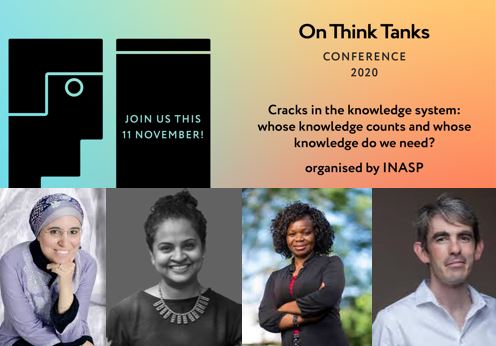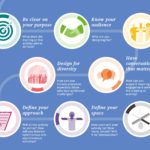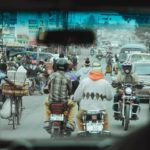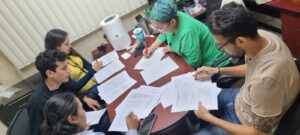
Exploring the cracks in our knowledge systems
The COVID-19 pandemic has highlighted and emphasised many of the inequities in our current knowledge systems, but it has also provided an opportunity to reflect on what could be improved, as Maha Bali, Chalani Ranwala, Joy Kiiru and Jon Harle discuss.
The last nine months or so have drawn attention to the processes of exclusion that run through our knowledge systems.
On 11th November, Dr Maha Bali (Associate Professor of Practice at the Center for Learning and Teaching at the American University in Cairo), Chalani Ranwala (manager of Media and Communications at Verité Research in Colombo) and Dr Joy Kiiru (Deputy Board Chair at the Mawazo Institute and Senior Lecturer at the University of Nairobi) came together with Jon Harle (INASP’s Director of Programme) to think about these issues.
The starting point for our conversation was that the best way to create knowledge that serves the needs of our communities is to make that process of producing and using knowledge more inclusive.
If we don’t then the body of knowledge that we generate is likely to be a lot less valuable, because it will neglect the experiences, needs, perspectives and insights of a great many of the people who make up our communities and societies.
A particular feature of the last year has been the central role of digital technologies. Who has access to those, so they can study and work and be part of the many discussions taking place?
Maha Bali: It has become much easier to attend a conference when its online. Although many of these are still led by actors in the global North, there have been many more organised by Southern networks. That’s good for Global South voices – if the North want to listen, of course!
It feels like it has been good for open educational resources too. Many educators have discovered new digital materials that have helped to fill gaps. But if we don’t have funding or money to develop our own materials, then we are relying again on content produced in the North.
Chalani Ranwala: So much has become free in recent months, with lots of apps available and courses or learning events free to attend. As a communications lead, it has become easier to plan events, and many people are taking advantage of “free” access to events (that is, no registration or travel fees, although, of course, there are data fees) to participate.
Joy Kiiru: There is a lot that is freely available, but technically not freely accessible – because there are exclusions like who can access electronic gadgets, who can access an internet connection and who has the technical know-how to access all these platforms. For example, a third of my large undergraduate classes and about two thirds of the smaller graduate classes make it to my online classes. If you cannot login, you are quickly left behind.
Maha Bali: Infrastructure and connectivity are important, but there is also the language of digital spaces and literacies to make best use of them – which also points towards inequities within those who do have access. In Egypt, everyone who can get online has access to the Egyptian Knowledge Bank – but it can be very hard to use if you’re not used to digital research tools.
How inclusive are the spaces that digital platforms create?
Chalani Ranwala: The move to video calls, with everything mediated via a phone or a laptop, has created some serious gaps for individuals with visual or hearing impairments, or other disabilities.
Maha Bali: Technology is never neutral. We need to take a social justice lens to questions of technology and ask “who has the power to decide the format of these learning spaces and events?” and “how can technology give or take away the power to allow particular voices to be heard?”
Who gets invited to speak? Who is given a slot in the plenary, and whose voices are limited to breakout rooms? Who controls the mute button? And what about the voice that might whisper something next to you that you can’t now hear?
The different platforms have become more prominent in our day-to-day lives, but what else do we need to think about here?
Maha Bali: People often start with the tools, but we need to look at things at the level of practice. What works for teachers and students, not what does the technology allow us to do? Offline and online systems do not automatically map onto each other. At American University in Cairo (AUC) it was relatively straightforward to move online, but each faculty did things differently. And if you don’t have common offline systems to start with, you can’t map your online systems to these. We also need to think beyond the content – to the social learning needs, and the social-pastoral needs of learners.
Strategies for inclusion also depend on context. For example, in South Africa the University of Cape Town decided the most equitable way to move learning online was to be asynchronous, so they could study when and how it suited them, but at AUC that actually made it harder for our students, because it required them to structure their learning, manage their time and motivate themselves without the structure of a timetable.
Moving from student learning to research, what issues do we encounter?
Chalani Ranwala: A lot of research that is produced and disseminated from Colombo is in English, but Sri Lanka is a tri-lingual country. We need to adapt our research – our publications and communication strategies have to be shared in local languages if we are to get beyond urban areas and the knowledge bubbles of Colombo. It’s not just a matter of translation. We need to understand the nuances of the language, the idioms, and how ideas are framed. We might need to use different tools and channels to communicate in different languages and reach different communities.
Joy Kiiru: Everyone has their own biases when it comes to research and who can or should produce it and even who should consume the outputs of that research. These biases could be about gender, about where someone comes from, or about race. Yet by understanding that each of these aspects, that form the foundations of our biases, are critical in creating, enriching and consuming knowledge products, we begin to see the importance of diversity. We also begin to appreciate the need to value and embrace a diversified system of research production. By embracing diversity, we are in a better position to solve complex problems.
What about how we value different ideas and knowledge?
Joy Kiiru: In the early days of Covid there were some scary predictions of the impact on Africa, but this hasn’t happened. Local and African-produced knowledge has given us alternative responses to those in Europe. If we had followed the approach in the North, of strict lockdowns, people would have died from hunger before they did from Covid. We lack the systems and financial capacity to provide adequate social protection to millions of people who live on daily wages and must go out to work every day to put a meal on the table. Local knowledge has helped us find local solutions to our everyday existence while minimising the impacts of Covid.
Chalani Ranwala: It has become a challenge to make people value information based on its accuracy and credibility. In Sri Lanka, like in many countries, information is often shared along with opinions and sentiments, rather than data and evidence. This aggravates the problem of misinformation, as people often share information that does not come from a verified source. While people may still value the truth, credible sources that provide the truth are scarce. What we need to do to break this pattern is continuously produce and share work that is clearly driven by data and evidence, and not just based on opinion. Over time, this also helps institutions gain credibility in society as a source of accurate, reliable information.
How do these values get translated into our systems?
Joy Kiiru: Through Covid, we have learnt that the consequences of these inequities in knowledge systems can be huge. What can we do to address that? Firstly, we need to think about how we measure what “good” looks like. At the moment, someone else is deciding what quality looks like in the work we do. Whereas there is nothing intrinsically wrong with that, the question we need to ask is “good for what, for whom?” What’s the point in producing knowledge that is deemed good elsewhere but does not relate to solving your own problems? Isn’t it better to adopt a metric system that allows contextualised knowledge to be produced and consumed?
Maha Bali: Those of us who have succeeded in academia under the current systems need to recognise our own bias too, and the norms about research that we have learnt from studying in the North, or from systems that are aligned to the North.
Joy Kiiru: There is a huge and important bias in our systems, which is the idea that the North will build capacity and knowledge in the South. If you are in the South, the bias encourages you to think of yourself as a consumer of Northern knowledge, or as a broker between North knowledge and its producers and Southern contexts, but not a producer of knowledge in your own right. That is very misleading; we’re not just the brokers, or just people who know paths through the village and therefore can assist a team of western researchers to collect data. No, we are well knowledgeable if only the others took a moment to listen and relate, we are good researchers, and we should also be Principal Investigators. That’s difficult though when so much research is funded from outside.
How important is the funding then in enabling us to tackle inequity?
Maha Bali: If it’s the funding that is pushing us the wrong way, and to do the wrong thing, can we do without it? Instead of thinking about how to get more funds to replace Northern funding, perhaps we should also ask ourselves when we actually need that funding? Can we just do without it?
Over the year I was able to develop some online community building resources with some colleagues, and we did it without funding (other than the costs of our time of course). They weren’t polished and produced, but they were what we needed, and we weren’t held back by a lack of funding.
—
The conversation showed us that, as well as the obvious ways in which the digital shifts have created opportunities and obstacles, we can’t separate these from the deeper questions about what’s not working with our contemporary knowledge systems.
Whose ideas and knowledge are valued? How is that legitimated by the methodologies and practices that come to be “accepted” by global systems of research and knowledge production? How do these translate into norms, and into tools of assessment, which determine what is funded, what is published, valued?
It’s easy to agree that equity matters, but that is often followed by a “but”, which seems to place equity and excellence on opposite sides of the spectrum – where equity is desirable, but not at the expense of excellence. But excellence – what is good, what is valuable, what is quality — tends to be decided by those who have the most power. At INASP, we want to disturb those asymmetries in power, and doing that means being more aware of, and being ready to change, our own role.
Some of INASP’s ideas on these questions can be found in our full paper: (In)equitable knowledge systems: before, during and beyond a pandemic
A video of the session is available here.

 Previous Post
Previous Post Next Post
Next Post


